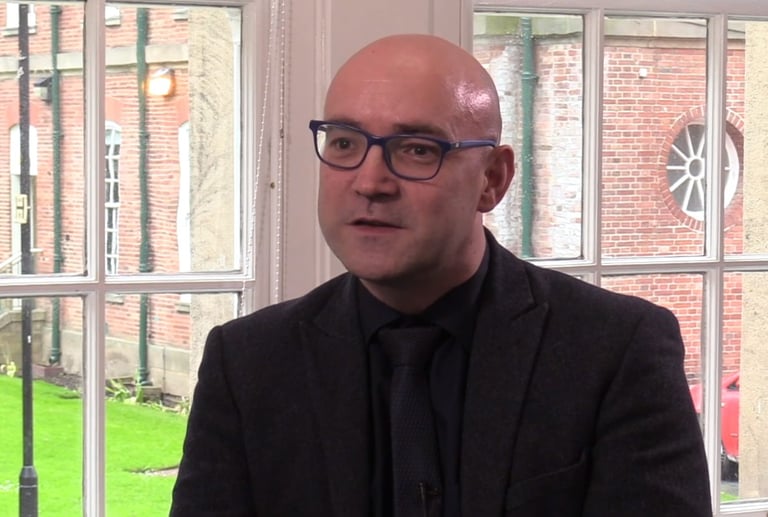Pupil Mental Health and The Carnegie School of Education at Leeds Beckett University


Who are you and what is the Carnegie Centre of Excellence for Mental Health in Schools?
I’m Jonathan Glazzard and I’m Professor of Teacher Education at Leeds Beckett University. We established the Carnegie Centre for Excellence for Mental Health in Schools in 2017 to support schools with the implementation of whole school approaches to mental health. We are aware that there are increasing numbers of children demonstrating signs and symptoms of mental ill-health. We know that external health services are really, really stretched and that children don’t get the support necessarily that they need because waiting lists are so long.
So, schools are therefore in a position where they need to support these children – but teachers are not health professionals, they’re educators. They’re not qualified to deliver therapeutic interventions and that’s why schools are coming to us for help in supporting the mental health needs of pupils.


Professor Jonathan Glazzard provides a valuable insight into the first steps that schools and academies can take to support their pupil's mental well-being
What are the issues surrounding mental health that you feel are particularly important to address in pupils?
In the Carnegie School of Education at Leeds Beckett University, we have created resources and have written guides – some of which I have authored with a colleague – Samuel Stone. One is for early years schools, there’s one for primary, one for secondary one for further education and one for higher education. There’s also one for the theoretical perspective of LGBTQ+ inclusion and that deals with issues around religion and how schools can address it.
What part does social media play in student stress?
One of the key issues that we need to address is social media and mental health. We’re seeing increasing numbers of younger children using social media, even as young as two or three. There’s issues surrounding cyberbullying: social media presents children with risks. There’s issues surrounding body image and sleeplessness: children aren’t getting enough sleep because they’re constantly checking their messages at night. Children are then turning up to school tired, being unable to concentrate and disengaged from their learning. Children are living in a complex time in which they feel the need to be constantly connected and not miss out on anything that’s going on online, which in turn causes them significant stress.
Do you think young people are fully aware of the various risks that social media presents?
If the behaviour becomes more worrying, this might be an opportunity to explain in more detail what is wrong with this behaviour. You should monitor the behaviour to see if it persists and you might want to provide your child with extra support.
If the behaviour is very worrying and more serious, then you need to make sure that you are very clear about what the behaviour is and why it is wrong, ask your child to stop engaging in this behaviour and perhaps seek some advice, for example from a childcare professional such as a health visitor, a GP or a social worker.
Who has responsibility for dealing with social media issues?
I don’t think schools can solve all the issues. Schools can educate children to be responsible digital citizens and teach them about the risks of social media, but parents also have a responsibility to set ground rules. Social media companies also have a responsibility to keep young people safe but we know that some have not responded fast enough to some reports of abuse. The government are now pressurising social media companies to take quicker action against perpetrators of abuse online.
Having training mental health first aiders is becoming increasingly common in schools. What benefits do you think training brings?
So Mental Health First Aid England have done a fantastic job at actually developing training, not just for schools but for lots of organisations. I think the benefit is that it enables practitioners to identify the signs and symptoms of mental ill-health and puts them in a better position to spot people who need support. However, what we have less research on is the impact of that training on children and young people. We also need to know when that training must be renewed – when does it lose its shelf-life?
Do you think the current school curriculum offers enough information and advice to students regarding their mental health?
The new Ofsted framework now includes aspects of mental health, but schools will still need further support. They will need to access resources and materials in order to plan and deliver that curriculum effectively.
What forms of support and guidance for pupils do you offer to schools and academies?
In the Carnegie Centre for Excellence for Mental Health in Schools, we have developed a research-informed framework. The brilliant thing about working at the university and with academics is that we are able to synthesise research to produce and evidence-based framework to then help schools to implement a whole school approach to mental health. We make it really cheap for schools to take part, and assign them a coach to work with. We then provide them a diagnostic tool through which they audit their existing provision for mental health and identify the gaps. The school and the coach then create action points from this audit and aim to implement them across a twelve month period whilst working towards our Award. After the submitting their evidence, each school will receive a Bronze, Silver or Gold Level Award.
How can the Carnegie Centre help staff with mental health issues?
We provide coaching – a collective education service for schools and colleges, to provide impartial support for staff who need to talk through issues, which isn’t tied to performance management. This is really powerful, as it’s the coaching that is really significant in helping with their mental health and is actually keeping them in the profession. It’s really significant for head teachers, and the research suggests that coaching is really powerful and it’s not only a way of offloading, but also validating the decisions you make on a day to day basis and having someone else to talk to. The problem for heads is that they often talk to their chair of governors, but they are also accountable to their chair of governors – they have actually employed them, so there is a power imbalance there. What we provide through our coaching system is a mechanism for schools teachers to talk informally, away from any line management, about the issues they are dealing with.
We are currently doing a research project with the Educational Support Partnership, based in Cumbria, looking at the resilience of head teachers, as head teachers have no-one to talk to. You hear about various initiatives – yoga and fun days and after school clubs for staff but actually, it’s the last thing that teachers need! At the end of a busy day, when they have been teaching and they have marking to do, that is just going to add to their stress. Some teachers like it, but lots say that it’s not valuable and they don’t want to do it. What they need is coaching and someone to talk to informally and impartially about their job – other professions get it and there’s not enough of it in the education system
What is the School Mental Health Quality Mark and how can schools and academies participate?
The School Mental Health Quality Mark is based on a framework that we have designed, including a list of quality indicators for what constitutes Bronze, Silver or Gold provision. The underlying statements of these three levels are very similar, but the difference lies in how well the provision is imbedded. We’re really pleased if schools are getting Bronze, because that means they’re doing something, which is fantastic.
What training do you offer?
The School Mental Health Quality Mark is based on a framework that we have designed, including a list of quality indicators for what constitutes Bronze, Silver or Gold provision. The underlying statements of these three levels are very similar, but the difference lies in how well the provision is imbedded. We’re really pleased if schools are getting Bronze, because that means they’re doing something, which is fantastic.
What mental health concerns do you find to be the most prominent amongst staff?
There is a big issue with teacher mental health at the moment. I know this from the research that I have done – in 2018 I did a survey which was completed by over 800 teachers – over 50% said they had mental ill health. Most of them said that it had been diagnosed by a GP. We also know from research that the Education Support Partnership has done, that there is a significant issue with teacher stress and teacher wellbeing. The statistics show the situation has become significantly worse between 2017-2018 – in particular, in new teachers. Teachers in the first five years of the profession experience more stress. Senior leaders are also extremely stressed and often have nobody to support them as they’re so busy supporting others.
How can managers support their employees and create a positive culture of mental health?
When I interview teachers, they have said to me that it isn’t just about the workload. We hear a lot about teacher workload, but the government are taking steps to reduce that - as are schools. It’s also in the Ofsted framework for school leaders to reduce teacher workload. All this is really positive. When I interview teachers they have told me that “It’s not just about the workload - actually we are hardworking people. We knew that teaching was going to be hard work and we don’t mind that – it’s about the school culture. If the school culture is positive and we feel supported and valued, we can cope with the workload.”
One of the key issues is that we know that in some schools, teachers are not supported or valued and there isn’t a positive culture and teachers aren’t trusted to get on with their job and they have been deprofessionalised. Teachers have told me that this is toxic and that is the thing that breaks them down – when they feel they aren’t supported or valued and they feel that their face doesn’t fit and they’re on a hit list. Teachers have told me that the workload is annoying and can be high at times and there are pinch points in the year when it’s higher, but the issues go deeper than workload and I think that we must look at school culture and we have to look at the training of senior leaders – they are the ones who can create that ethos -that culture, and we have to start thinking about the way we train our school leaders in those sorts of issues. It’s the school culture that breaks teachers and it’s the school culture that causes teachers to leave the profession.
What part does student behaviour play in teacher wellbeing?
Student behaviour is one of the reasons often cited for teachers leaving the profession. I’m not convinced that it’s any worse that it used to be. Behaviour and workload are often cited as reasons why teachers leave the profession, but teachers have told me that student behaviour can be really bad, but if they are supported by line managers and leaders, they’re fine. They say, “We can be in a really tough school, but it’s fine if we work as part of a team.” The issues go deeper than workload and student behaviour – we need to look at the culture of the school much more.
What forms of support and guidance can the Carnegie Centre provide for school or academy staff?
We go out to lots of schools –we engage with them on how to create a positive school culture. We work with senior leaders and we support staff and provide coaching. When you think about it, other professions such as counselling, social care and social work, deal with difficult situations on a daily basis and they have professional supervision, so they can talk with someone impartial – they can meet with someone once a month and talk about the cases they are dealing with and they can offload – teachers don’t have that.






Office 27, East Moons Moat Business Centre
Oxleasow Rd, Redditch B98 0RE
Phone: 0333 207 0737


